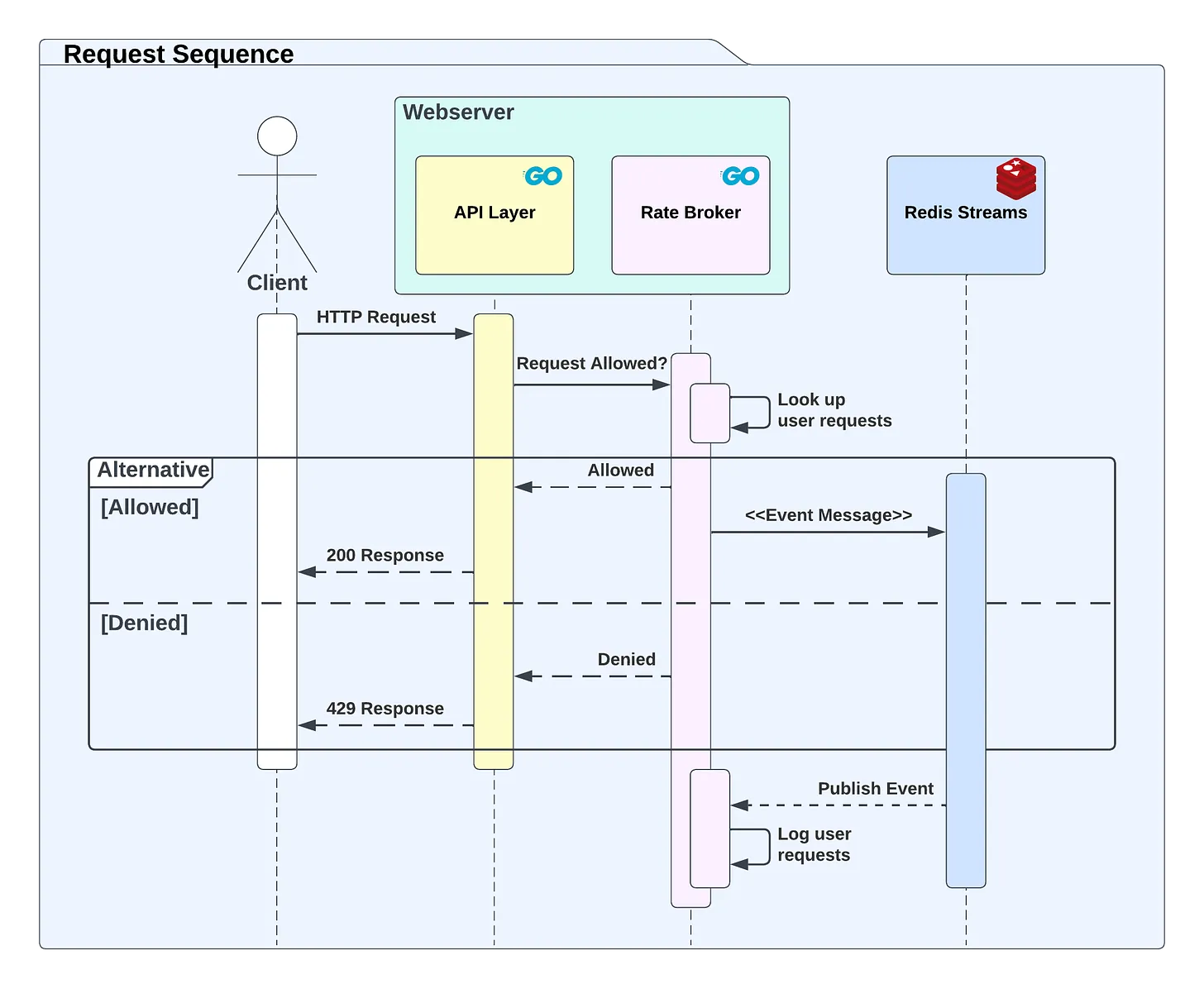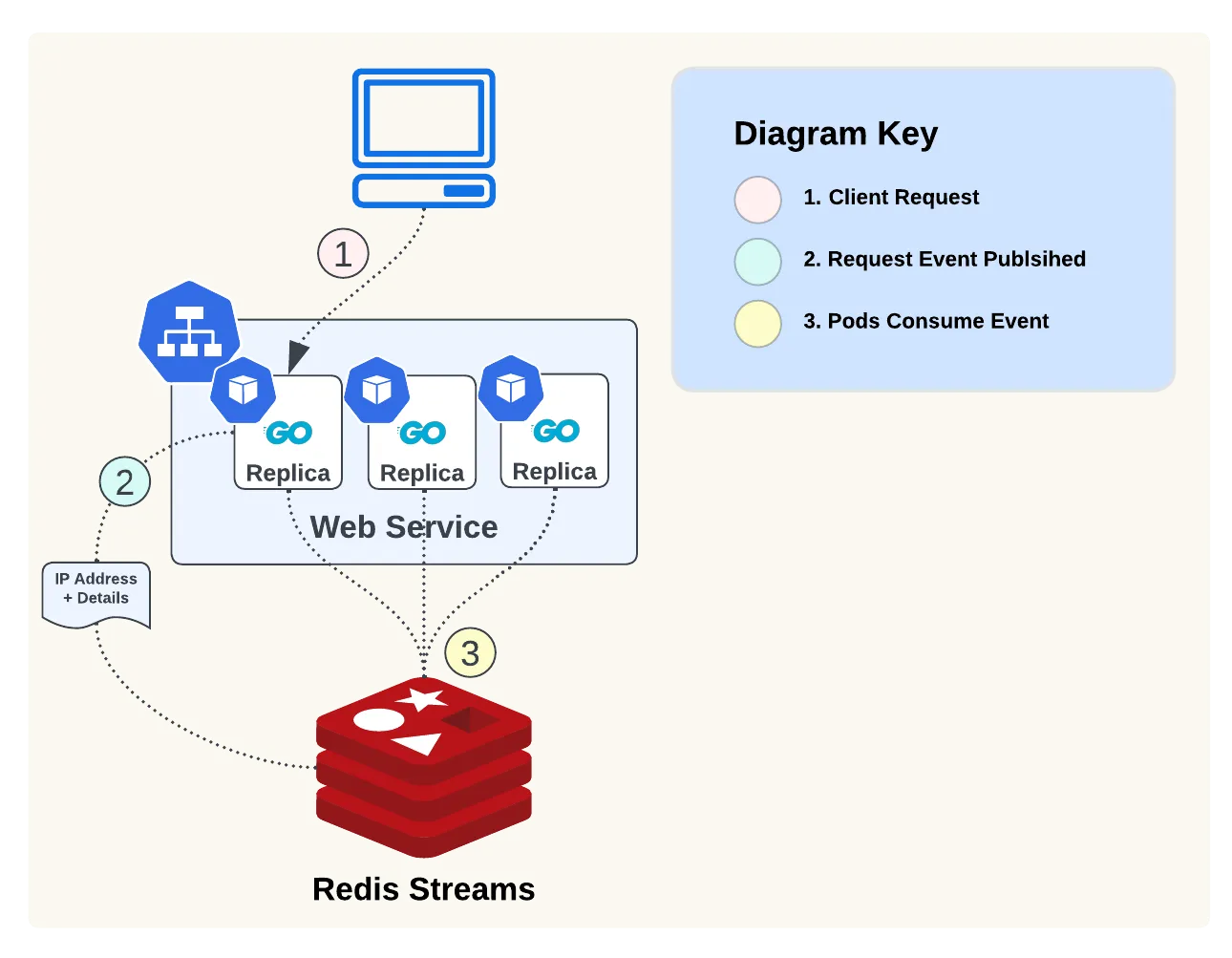 Documentation
¶
Documentation
¶
Overview ¶
Package ratebroker manages rate limiting across various clients/servers, enabling control over request frequency per user within a specific time frame and maximum request count.
One feature of ratebroker is its compatibility with message brokers to distribute rate limits across multiple subscribers on the same topic/channel/stream. It uses an interface, allowing adaptability with any message broker that follows the prescribed method signature. This package includes support for Redis Streams, detailed at https://redis.io/topics/streams-intro.
Without an external message broker, ratebroker employs a local limiter. Usage example:
import (
"time"
"github.com/parkerroan/ratebroker"
)
func main() {
// Set up ratebroker with a local limiter.
rb := ratebroker.New(
ratebroker.WithMaxRequests(10),
ratebroker.WithWindow(10*time.Second),
)
allowed, detail := rb.TryAccept("userKey")
// ... other code ...
}
The package utilizes 'limiters' to enforce rate limits. By default, a ring buffer limiter is used.
Two standalone limiters are also available, separate from the main ratebroker functionality, for scenarios not requiring distributed or user-specific rate limits:
1. Ring: The default, a ring buffer limiter suitable where slight leniency is acceptable. Details at https://github.com/parkerroan/ratebroker/limiter/ring.
2. Heap: A min-heap limiter for contexts needing higher precision, sorting requests by timestamps. Though more accurate, it requires more resources. See https://github.com/parkerroan/ratebroker/limiter/heap.
The choice between Ring and Heap depends on the precision and resource constraints of your application.
Index ¶
- Constants
- func HttpMiddleware(rb *RateBroker, keyGetter func(r *http.Request) string) func(next http.Handler) http.Handler
- func WithInitLoadOffset(offset time.Duration) func(*RedisMessageBroker)
- func WithStream(stream string) func(*RedisMessageBroker)
- type LimitDetails
- type Message
- type MessageBroker
- type NewLimiterFunc
- type Option
- func WithBroker(broker MessageBroker) Option
- func WithID(id string) Option
- func WithLimiterContructorFunc(limiterFunc NewLimiterFunc) Option
- func WithMaxRequests(max int) Option
- func WithMaxThreads(maxThreads int) Option
- func WithNTPServer(server string) Option
- func WithWindow(window time.Duration) Option
- type RateBroker
- type RedisMessageBroker
Constants ¶
const (
// RequestAccepted is the event type for a request that was accepted.
RequestAccepted = "REQUEST_ACCEPTED"
)
Variables ¶
This section is empty.
Functions ¶
func HttpMiddleware ¶
func HttpMiddleware(rb *RateBroker, keyGetter func(r *http.Request) string) func(next http.Handler) http.Handler
HttpMiddleware creates a new middleware function for rate limiting. This function is compatible with both standard net/http and mux handlers.
func WithInitLoadOffset ¶
func WithInitLoadOffset(offset time.Duration) func(*RedisMessageBroker)
WithInitLoadOffset is a time duration that will allow the pulling of older messages on startup from the topic. This would be used for not losing client request history on restart.
func WithStream ¶
func WithStream(stream string) func(*RedisMessageBroker)
WithStream sets the Redis stream name, a good value would be the name of your application. default: "ratebroker"
Types ¶
type LimitDetails ¶
LimitDetails is a struct that contains the max requests and window for a single limiter.
type Message ¶
type Message struct {
BrokerID string `json:"broker_id"` // The ID of the broker
Event string `json:"event"` // Type of event, e.g., "request_accepted"
Timestamp time.Time `json:"timestamp"` // When the event occurred
Key string `json:"key"` // The key of the request, e.g., IP, UserID, etc.
}
Message represents the structure of the data that will be sent through the broker.
type MessageBroker ¶
type MessageBroker interface {
Publish(ctx context.Context, msg Message) error
Consume(ctx context.Context, handlerFunc func(Message)) error
}
MessageBroker is an interface that defines the methods that a broker must implement. The broker is responsible for publishing and consuming messages and could be implemented in any message broker, e.g., Redis, Kafka, etc.
type NewLimiterFunc ¶
NewLimiterFunc is a function that creates a new limiter.
type Option ¶
type Option func(*RateBroker)
Option is a function that can be passed into NewRateBroker to configure the RateBroker.
func WithBroker ¶
func WithBroker(broker MessageBroker) Option
WithBroker sets the broker for the RateBroker.
If no broker is provided, the RateBroker will not publish events to the message broker.
Instead it will use the local limiter to enforce rate limits without distribution.
func WithID ¶
WithID sets the ID for the RateBroker ID is used to identify messages published by the RateBroker and should be unique per pod/replica
func WithLimiterContructorFunc ¶
func WithLimiterContructorFunc(limiterFunc NewLimiterFunc) Option
WithLimiterContructorFunc sets the function used to create a new limiter. The default is limiter.NewRingLimiterConstructorFunc() If you want to use a different limiter, you can pass in a function that creates it. For example, limiter.NewHeapLimiterConstructorFunc() is a supplied limiter that uses a heap instead of a ring buffer.
func WithMaxRequests ¶
WithMaxRequests sets the maximum number of requests allowed within the supplied window for the RateBroker.
func WithMaxThreads ¶
WithMaxThreads sets the maximum number of threads allowed for publishing events to the message broker.
func WithNTPServer ¶
WithNTPServer is an option to set the NTP server for the RateBroker. If this option is not used, the RateBroker will use the system's local time.
func WithWindow ¶
WithWindow sets the time window for the RateBroker.
type RateBroker ¶
type RateBroker struct {
// contains filtered or unexported fields
}
RateBroker is the main structure that will use a Limiter to enforce rate limits.
func NewRateBroker ¶
func NewRateBroker(opts ...Option) *RateBroker
NewRateBroker creates a RateLimiter with the provided Limiter.
func (*RateBroker) Now ¶
func (rb *RateBroker) Now() time.Time
Now tries to get the time from the NTP server if available; otherwise, it uses the local time.
func (*RateBroker) Start ¶
func (rb *RateBroker) Start(ctx context.Context)
Start is a method on RateLimiter that starts the broker consuming messages and handling them in the background.
func (*RateBroker) TryAccept ¶
func (rb *RateBroker) TryAccept(ctx context.Context, key string) (bool, LimitDetails)
TryAccept is a method on RateLimiter that checks a new request against the current rate limit.
type RedisMessageBroker ¶
type RedisMessageBroker struct {
// contains filtered or unexported fields
}
RedisMessageBroker is an implementation of the Broker interface that uses Redis as the message broker.
func NewRedisMessageBroker ¶
func NewRedisMessageBroker(rdb *redis.Client, opts ...func(*RedisMessageBroker)) *RedisMessageBroker

